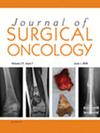Laparoscopic Cytoreductive Surgery and Hyperthermic Intraperitoneal Chemotherapy, an Update From the International PSOGI Registry.
IF 2
3区 医学
Q3 ONCOLOGY
引用次数: 0
Abstract
INTRODUCTION Cytoreductive surgery (CRS) and hyperthermic intraperitoneal chemotherapy (HIPEC) are established treatments for peritoneal surface malignancies, traditionally performed via laparotomy. Recent advancements in laparoscopic approaches (L-CRS + HIPEC) have shown promising results in selected patients. METHODS The PSOGI registry, established in November 2019, collects data from specialized centers performing L-CRS + HIPEC. Data were collected prospectively and analyzed retrospectively, excluding risk-reducing procedures without peritoneal disease. The learning curve was assessed using a 14-cases cutoff. RESULTS Today, 323 patients have been registered, 193 were included finally. Perioperative outcomes improved after 14 cases: Length of hospital stay was 7.78 ± 3.64 days (consolidation) versus 8.8 ± 8.79 days (learning) and major morbidity was 0% (consolidation) versus 5% (learning), (p = n.s.). Estimated blood loss was lower in the consolidation phase. Oncological outcomes also improved: Recurrence rate was 8.7% (consolidation) versus 17.8% (learning). Disease-free survival 5 years, 65% (learning) versus 88% (consolidation) (p = 0.012). CONCLUSION The L-CRS + HIPEC is a safe procedure with non-inferior oncologic outcomes which it is evaluating in an IDEAL setting by an international group. The validation of the learning curve, gives us the knowledge that a mentoring program must be setup to reduce the learning curve impact in oncologic failure.腹腔镜细胞再生手术和腹腔内热化疗,国际 PSOGI 登记的最新进展。
简介腹腔镜手术(CRS)和腹腔内热化疗(HIPEC)是治疗腹膜表面恶性肿瘤的成熟疗法,传统上通过开腹手术进行。腹腔镜方法(L-CRS + HIPEC)的最新进展显示,在选定的患者中取得了很好的疗效。方法PSOGI注册中心成立于2019年11月,收集了实施L-CRS + HIPEC的专业中心的数据。数据采用前瞻性收集和回顾性分析,不包括无腹膜疾病的风险降低手术。结果目前共有 323 例患者登记,最终纳入 193 例。14例之后,围手术期结果有所改善:住院时间为 7.78 ± 3.64 天(巩固期)对 8.8 ± 8.79 天(学习期),主要发病率为 0%(巩固期)对 5%(学习期),(P = n.s.)。巩固治疗阶段的估计失血量较低。肿瘤治疗效果也有所改善:复发率为 8.7%(巩固期)和 17.8%(学习期)。结论L-CRS+HIPEC是一种安全的治疗方法,其肿瘤治疗效果并不优于其他治疗方法。学习曲线的验证使我们认识到,必须制定指导计划,以减少学习曲线对肿瘤治疗失败的影响。
本文章由计算机程序翻译,如有差异,请以英文原文为准。
求助全文
约1分钟内获得全文
求助全文
来源期刊
CiteScore
4.70
自引率
4.00%
发文量
367
审稿时长
2 months
期刊介绍:
The Journal of Surgical Oncology offers peer-reviewed, original papers in the field of surgical oncology and broadly related surgical sciences, including reports on experimental and laboratory studies. As an international journal, the editors encourage participation from leading surgeons around the world. The JSO is the representative journal for the World Federation of Surgical Oncology Societies. Publishing 16 issues in 2 volumes each year, the journal accepts Research Articles, in-depth Reviews of timely interest, Letters to the Editor, and invited Editorials. Guest Editors from the JSO Editorial Board oversee multiple special Seminars issues each year. These Seminars include multifaceted Reviews on a particular topic or current issue in surgical oncology, which are invited from experts in the field.

 求助内容:
求助内容: 应助结果提醒方式:
应助结果提醒方式:


